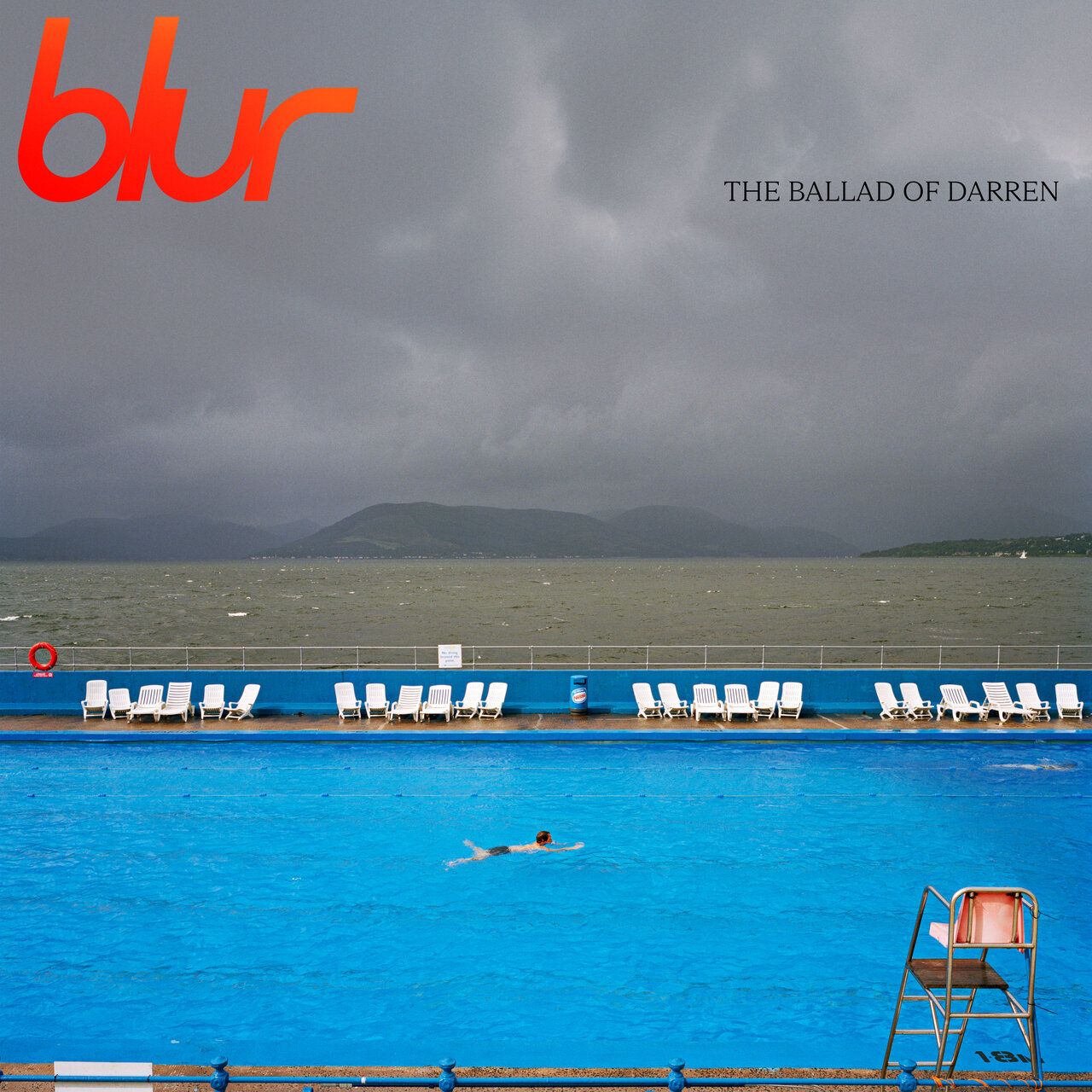Blur Returns With ‘The Ballad Of Darren’
The band’s 9th album is a short, subdued affair
And so it starts again with a ballad. One that Damon Albarn started 20 years ago as, literally, “Half A Song,” finished at the urge of bodyguard Darren ‘Smoggy’ Evans and now the opening track on The Ballad Of Darren, Blur’s first album in eight years. Albarn has written many ballads, probably a few too many: about love, about sadness, about England. Yet “The Ballad” stands out in how defeated it is, especially as the opener for such an anticipated record. It signals not so much an advancement, or a triumphant return to form, but rather an affirmation that after more than 30 years, Blur still exists.
Blur’s history is one of tension, disillusionment, and resulting brilliance. Frontman Albarn and guitarist Graham Coxon met growing up in Essex; Coxon described the theater-kid Albarn as “confident” but a “show off.” They both ended up at Goldsmiths College in London, where they formed a band with drummer Dave Rowntree and bassist Alex James. Then known as Seymour, they signed to Food Records on the condition that they change their name, and from a list of options they picked Blur. Their 1991 debut album Leisure tanked after promising initial sales, as it tried too hard to fit with the era's trendy "baggy” sound, only had a few good songs, and because Albarn’s lyrics were rushed. Blur toured America in 1992—homesick in a land where no one knew who they were, when grunge was at its height—and returned to England to make Modern Life Is Rubbish, a distinctly English record in the lineage of The Kinks and XTC, whose Andy Partridge produced early, unused sessions for the album.
1993’s Modern Life Is Rubbish, and its succeeding albums Parklife and The Great Escape, reacted against American culture’s increasing worldwide power: “La, la la la la, he’d like to live in magic America with all those magic people,” Damon Albarn taunts on Parklife’s “Magic America.” Yet he was just as critical of middle- or upper-class, middle-aged English people living in the suburbs or country; “Charmless Man” from The Great Escape speaks of someone who “thinks his educated airs, those family shares/Will protect him, that we’ll respect him/He moves in circles of friends who just pretend that they like him, he does the same to them,” while that album’s lead single “Country House” mocks David Balfe, the Food Records founder who sold the label to EMI and literally moved to “a very big house in the country.” Albarn’s observational lyrics and sharp melodies paired perfectly with Graham Coxon’s inventive, sometimes dissonant guitar work, a tension that defines what makes Blur so great.
As Blur reached success at the mid-90s height of Britpop, band infighting increased, as did tabloid and chart rivalry with Oasis, publicity around Albarn’s relationship with Elastica frontwoman Justine Frischmann, drug use, and drinking. Coxon got tired of Britpop and started listening to Pavement, while Albarn stopped focusing on characters in his lyrics and embraced more atmospheric sounds. Their 1997 self-titled record at last (sort of) broke them in America with the not-very-serious “Song 2,” though the album is much more experimental and nuanced than that. Blur’s 1999 masterpiece 13 came as Albarn’s heroin use and Coxon’s drinking further escalated. Dysfunctional as the band was, 13 matches Albarn’s core pop sensibilities, Coxon’s noise, and producer William Orbit’s sonic treatments on a sprawling double album that’s one of the great art rock albums of all time. Coxon left in 2002 after missing a flight to Morocco, where Albarn, James, and Rowntree worked on Think Tank, a more overtly political record that despite some failed experiments stands its own ground in Blur’s impeccable discography. Around that time, Albarn was also busy with his virtual band Gorillaz, but that’s another story.
The Ballad Of Darren, produced by James Ford, arrives as Blur once again reunites for more shows, including two recent headlining concerts at Wembley Stadium. While Coxon rejoined in 2008, Albarn regards this as the first “legit” Blur record since 13, since Coxon appears just once on Think Tank, and their first reunion album, 2015’s The Magic Whip, was cobbled together from jam sessions around which they built songs. Albarn’s discography since Think Tank has been consistently inconsistent. “For every good record, one or two mediocre or bad records will follow,” I said in my review of Gorillaz’ underwhelming latest LP Cracker Island. Blur recorded The Ballad Of Darren with all the members in the same room, based on demos Albarn wrote during last year’s Gorillaz tour.
With 10 songs clocking in at 36 minutes, The Ballad Of Darren is by far the shortest Blur album, and a mostly subdued affair. “The Ballad” is a moving song suggesting a romantic breakup, notably opening with the line “I just looked into my life/And all I saw was that you’re not coming back.” But unsurprisingly given the album’s title, opening tone, and Albarn’s discography for the past decade, there are too many ballads here. Some of them are good: the aforementioned “The Ballad” is near-perfection, “The Everglades (For Leonard)” is pretty if nothing else, and “Goodbye Albert” finds Coxon's guitar brilliantly moving around the song's frame. Others come across as flat and redundant, like the sleepier “Far Away Island,” or “Russian Strings” which mournfully describes Russia under Putin the same way that The Magic Whip’s “Pyongyang” recounted Albarn’s experience visiting North Korea. The musically breezier “Barbaric” blends into everything else, despite a relatively catchy chorus and Alex James' Peter Hook-style bassline (when Albarn worked with Hook for Gorillaz' "Aries," Hook showed him how to copy his bass sound). Sure, Albarn can’t serendipitously fart out brilliant melodies like he did in the late 90s, but even when he does, the presentation is often too dull. The Ballad Of Darren doesn’t have any bad songs, but comes across as monotonous because it has so many lonely, sentimental ballads.
James Ford’s production and David Wrench’s mix is another issue, in how Coxon’s guitar textures are mostly relegated to a background element and how the atmospheres are indistinct. The effects aren’t obvious in what they are, but it’s obvious that they’re there, and none of it sounds like a band playing in a room either. That's why The Ballad Of Darren’s best songs are the ones most sonically and lyrically direct. “St. Charles Square” is an energetic Bowie-esque rocker with loads of guitar and Albarn’s admission of “I fucked up/I’m not the first to do it” and an unglamorous portrayal of a “basement flat with window bars.” The straightforward “The Narcissist” is reflective of the band’s past difficulties and how they’ve overcome them, and builds up to a guitar-prominent climax as does the poignant closer "The Heights" which inconclusively ends with an assault of fuzzy guitar distortion.
Overall, The Ballad Of Darren is a fine enough album with a fair share of highlights, but is it a good Blur album? And to that, I’m still not sure. The rhythm section of Alex James and Dave Rowntree is tight as ever, but the signature musical tension between Albarn and Coxon, the reason why Blur’s original run of records gets even better with time, feels tamed. It doesn't sound like a Damon Albarn solo record, but the signature Albarn-Coxon contrast often isn't there. There’s no way that this album could be as good as the ones from Modern Life Is Rubbish through Think Tank—among the greatest runs of albums ever—but as a record that is satisfyingly Blur, The Magic Whip is better, even though you could argue that that one “checks the boxes” a bit and that The Ballad Of Darren is more cohesive as a full work.
The mix is competent but not appealing to me. There’s too much reverb on the drums, Albarn sounds like he’s singing in a tin can, and everything is congealed and devoid of character. Technically it’s fine, I just personally don’t like it. That said, the vinyl edition cut by Matt Colton at Metropolis (who also mastered the digital versions) is much better, with everything sounding more convincing. The vocal imaging is more realistic, the strings come close to actually sounding like strings, and overall separation is greatly improved. Optimal pressed the UK/EU editions while a GZ affiliate pressed the American copies. My copy of the indie-exclusive blue vinyl says "made in USA" and doesn't have the Memphis Record Pressing numerical etchings, so maybe it was pressed at the new Nashville Record Pressing. It only has some occasional low-level surface noise and at times is absolutely dead quiet. (Note that the UK/EU blue vinyl is darker and translucent while the US blue variant is lighter and opaque.) The packaging only consists of a foldover jacket and printed inner sleeve, but there's a deluxe edition with a CD and two bonus tracks on a 7" if you really want a nicer package. I just hope the back catalog on vinyl shows up for reasonable prices in the US again, as I only ever see the RSD pressings of remix compilation Bustin' + Dronin' and early B-sides compilation The Special Collectors Edition.
Some have asked what the best vinyl pressings of Blur’s earlier albums are. While the first five albums were recorded and mixed to tape (possibly with a digital step in between), hardly anyone in the 1990s assembled cutting masters with the full album or its complete sides stitched together. CDs were the focus, so people dropped a stack of individual reels with each song at the mastering studio, got it mastered for CD, then cut the vinyl usually from a CD-ready digital master. The 2012 editions done by Frank Arkwright at Abbey Road were mastered from 96kHz/24bit transfers of the original mixdown reels, and for the “life” trilogy albums, spread to double LP sets versus the original single LP releases. I can’t speak for the full discography, but I have an original single LP UK pressing of Parklife, cut DMM at Townhouse and pressed at EMI, and the 2012 double LP. The double LP has significantly better imaging and detail, though the crammed original has a warm midbass that some listeners might enjoy despite not being “accurate.” Also keep in mind that vinyl pressing quality in the 90s was inconsistent, and finding clean originals is difficult.










































.png)








